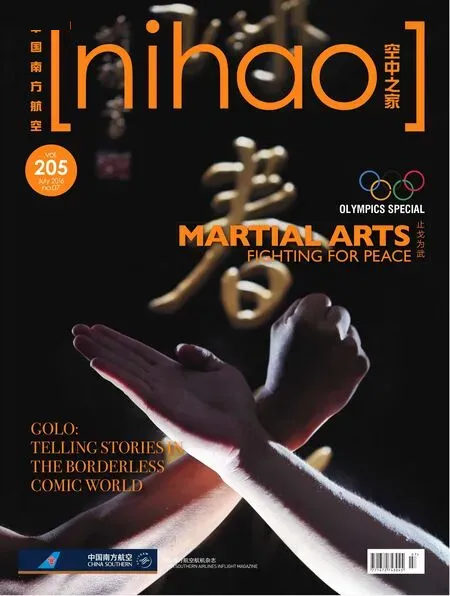武者,止戈也
武者,止戈也
FIGHTING FOR PEACE
Chinese martial arts were never created to start a fi ght. On the contrary, they are regarded as a power to end it. This spirit is actually implicated in the Chinese language, in which the character“Wu”(meaning “martial art”) is made up of two separate words: “stop”and “war”.
Text by Guo Hua Translation by Madz Photos by Zeng Jian
采访支持:佛山市委宣传部
There are three ranks of martial artists: the average ones are good at skills, yet they only fi ght for selfdefense; the middle rank are wise and settle themselves in a peaceful mind; while the best martial artists are philosophical and divine, and can ensure the safety of the country.
“For thousands of years, to reach the highest rank has been the ever persistent pursuit for countless Chinese martial artists,” said Professor Liu Yongfeng from Foshan Centre for Martial Arts Cultural Studies.
This ranking system, strictly abided by martial artists, re fl ects the need of a practitioners' ethics. Although different schools of martial arts have different moral requirements, there are certain traditional virtues that all schools embrace, such as “always put brotherhood ahead of your life”, “to eliminate the
evil and give peace back to the good” and so on.
An ideal example is Kungfu master Huang Feihong, who had all the virtues that Lingnan people praise: he was righteous, modest and patriotic. “The martial ethics Huang presented at the time is one of the main reasons for him to become a hot subject for movies and stories after he died,” said Professor Yao Zhaowen from the Faculty of Arts, Foshan University, “and so was 'The Grandmaster' Ip Man, who earned admiration and respect as an living example of the saying: “to subdue men by force only proves you are stronger, yet to win people with virtue makes you a benevolent man.” In “Wulin”(the martial art circle)”, a practitioner is never deemed a master if he is morally evil. Instead, his Kung fu may even be taken away from him and he would be expelled from his hometown.
止戈为武,以形化意,道出了中国武术文化的精神内涵。武,从更高层次而言,不是为了战胜对手,而是止息战斗的和平力量。
It is the importance that martial artists attach to the practitioner's personality that makes Kung fu long-standing till this day.
Chinese Kung fu pays equal attention to both the inside and the outside. The outside, obviously, means the muscles and bones, whilst the inside refers to “heart”, “spirit”,“mind”,“strength”, and “energy” .
“For practitioners, when they reach a certain stage, they have to practise their inner force in order to achieve a higher level,” explained Liu Yongfeng, “Those who have trained both sides can conceal their moves and skills subtly during a fi ght. They only hit a certain point, instead of trying to wound the other person with their every move. This way of trying to avoid making enemies is a good demonstration of Chinese philosophy. It is very different from westernsports such as boxing, in which both sides try to beat the other person down to the ground.”
An experienced Kung fu master with formidable inner force would not use his full strength during the fi ght. Instead, he would “borrow” his rival's strength artfully and strike back with it. With the help of inner force, a master can give out a strong move with little strength. When it is necessary, he would use his mind to forge inner force, powerful enough to penetrate walls.
The cultivation of the inner force is closely related to the essence of traditional Chinese medical science, which revolves around the balancing of human's mind and body. To achieve this balance, the practitioner should avoid too much loss of energy, and resort to the cultivation of mind and body for stronger body function. This explains why most great Kung fu masters are also experts in Traditional Chinese medicine.
Kung fu star Bruce Lee majored in Philosophy. Through comparing Chinese martial arts with western martial arts, he came up with a famous interpretation of Chinese Kung fu: it is just like water, shapeless and fl exible, yet it possesses the ability to penetrate rocks.
By reducing the rival's force and making it vanish, a great martial artist achieves the ultimate goal of ending the fi ght. This is the true artfulness of Chinese Kung fu.
In 2008, martial arts became an Olympic demonstration sport, and it has recently been made an of fi cial backup event in the 2020 Tokyo Olympic Games. In the near future, martial arts may enter the Olympics, and by then, the Chinese Kung fu spirit will for sure embrace its deserved glory.
中国武术,有三重境界:上武得道,平天下;中武入喆,安身心;下武精技,防侵害。“这是中国修武之士千百年来的不懈追求。”佛山武术文化研究中心主任刘永峰教授如是说。
这一追求,显形在武德上,被历代修武之人所遵守膜拜。武德是武林的道德规范,一般以各派各异的“门规”的形式存在,但也有一些普世的价值观,如重义轻生、除暴安良、锄强扶弱等。“一代武侠黄飞鸿身上就凝聚了岭南民众一致认同的传统美德。”佛山大学文学院姚朝文教授认为,“叶问能被誉为‘一代宗师’,也与他身体力行‘以力服人者霸,以德服人者仁’的理念息息相关。”在武林中,即便身手不凡,倘若没有德行,就会为人唾弃,甚至废其武功,逐出家门。
中国功夫注重“内外兼修”,外练筋、骨、皮,内修心、神、意、气、力。“习武达到一定水平,往上走,必须练内功。”刘永峰介绍说,“内外兼修的武者,动起手来,必然会将技巧隐于无形,在过招时也点到为止,不轻易树敌。这与西方拳击等竞技,要将对手打倒在地,有明显的不同。这也正是中国处世哲学的表现。”
内力高深的老拳师,过招时不会拼尽全力,而是会巧妙地借力打力,以四两拨千斤,展现谦谦君子之风。在必要时,以意念发出的内功,则有穿透千斤的力道。
这种内力的修炼,与传统中医理念息息相通,求身心的平衡,气脉的相通,引而不发,含而不露,减少对身体的损耗。这也是功夫精湛的武者多通晓中医的缘由。
大学专修哲学的功夫巨星李小龙在比较学习中西武术之后,这样阐述他对中国功夫的理解:中国功夫,就好像水,是世界上最柔软的物质,但它有穿透顽石的能力。
止戈为武,就是将力融于无形,化于柔软,达到止戈的至高境界。这就是中国功夫。
2008年,武术成为奥运表演项目,2020年入围东京奥运会正式候补项目。武术走向奥运指日可待,其承载的中华武术精神将随之走向更广阔的世界。
受访专家
Experts Interviewed

Liu Yongfeng
Director of the Foshan Martial Arts Culture Research Center, Member of the Foshan Martial Arts Association, Professor at Foshan University.
刘永峰 佛山武术文化研究中心主任、佛山武协成员、佛山大学教授。

Yao Chaowen
Guest Professor of Kokugakuin University Japan, Professor at Foshan University
姚朝文 日本国学院大学客座教授、佛山大学教授。

